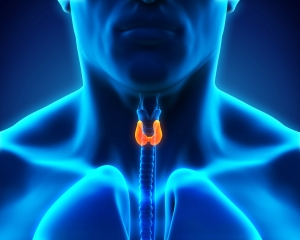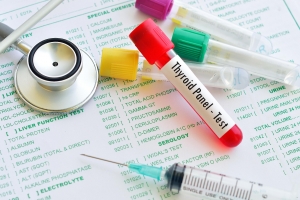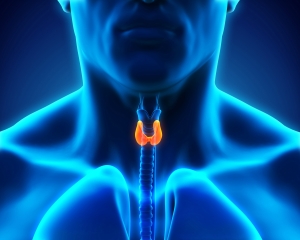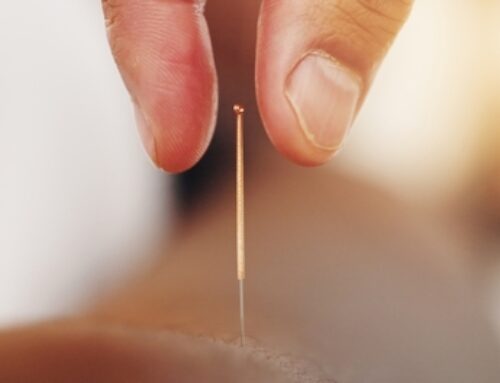“Doc, I think I have a thyroid problem!” These are the words that I hear nearly every day in the office, and often the patients are right. How can you tell the difference between a thyroid problem and an extended period of “vacation eating?” Is it a hormonal problem or too many trips through the fast food window?
For better or worse, a hormonal condition is heavily influenced by the diet. The typical American diet, in particular, takes aim at the regulatory system that involves the thyroid. It is no wonder that an estimated 25 million Americans have a thyroid problem, and half of them have no idea it exists. The most common thyroid disorder is hypothyroidism, or an underactive thyroid, and accounts for 90% of all thyroid imbalances.
The thyroid, a butterfly-shaped gland in the center of your neck, is the master gland of metabolism. How well your thyroid is functioning is interrelated with every system in your body. If your thyroid is not running optimally, then neither are you.
10 signs you could have an underactive thyroid:
1. Fatigue after sleeping 8 to 10 hours a night or needing to take a nap daily.
2. Weight gain or the inability to lose weight.
3. Mood issues such as: mood swings, anxiety, or depression.
4. Hormone imbalances such as PMS, irregular periods, infertility, and low sex drive.
5. Muscle pain, joint pain, carpal tunnel syndrome, or tendonitis.
6. Cold hands and feet, feeling cold when others are not, or having a body temperature consistently below 98.5.
7. Dry or cracking skin, brittle nails, and excessive hair loss.
8. Constipation.
9. Mind issues such as: brain fog, poor concentration, or poor memory.
10. Neck swelling, snoring, or hoarse voice.
How does your thyroid gland work?
Thyroid hormone production is regulated by a feedback loop between the hypothalamus, pituitary gland and thethyroid gland. Hypothalamic thyrotropin-releasing hormone (TRH) stimulates pituitary thyrotropin (TSH) synthesis and secretion. In turn, TSH stimulates production and release of T4 and T3 from the thyroid gland. When enough T4  is produced, it signals to TRH and TSH that there is enough thyroid hormone in circulation and not to produce more. About 85% of the hormone produced by our thyroid gland is T4, which is an inactive form of the hormone. After T4 is made, a small amount of it is converted into T3, which is the active form of thyroid hormone. To complicate matters, T3 also gets converted into either Free T3 (FT3) or Reverse T3 (RT3). It’s the Free T3 that really matters in all of this, since it’s the only hormone that can attach to a receptor and cause your metabolism to rise, keep you warm, keep your bowels moving, mind working, and keep other hormones in check. The role of Reverse T3 is not well known. However, individuals under extreme stress and those with mercury toxicity show elevated levels. For a complete thyroid diagnosis, make sure your doctor runs all of these tests. Take a look at some of our previous blog posts on thyroid disorders to get a complete list of the thyroid tests required to make an accurate diagnosis
is produced, it signals to TRH and TSH that there is enough thyroid hormone in circulation and not to produce more. About 85% of the hormone produced by our thyroid gland is T4, which is an inactive form of the hormone. After T4 is made, a small amount of it is converted into T3, which is the active form of thyroid hormone. To complicate matters, T3 also gets converted into either Free T3 (FT3) or Reverse T3 (RT3). It’s the Free T3 that really matters in all of this, since it’s the only hormone that can attach to a receptor and cause your metabolism to rise, keep you warm, keep your bowels moving, mind working, and keep other hormones in check. The role of Reverse T3 is not well known. However, individuals under extreme stress and those with mercury toxicity show elevated levels. For a complete thyroid diagnosis, make sure your doctor runs all of these tests. Take a look at some of our previous blog posts on thyroid disorders to get a complete list of the thyroid tests required to make an accurate diagnosis
A quick note on Hashimoto’s Disease:
This autoimmune disease is the most common form of hypothyroidism and the numbers are rising annually. An autoimmune disease is one in which your body turns on itself and begins to attack a certain organ or tissue as though they are foreign. It is highly believed that this is heavily influenced by our intake of gluten-containing foods that damage our intestinal lining. This leads to a condition known as Leaky Gut Syndrome. Leaky Gut is created by a dysbiosis of the bacteria in our gut as a result of our diet and intake of antibiotics. Without the ability to properly break down foods, damage occurs to our small intestine. This allows for larger food particles to enter the bloodstream and our immune system sees them as foreign. An immune response begins that unfortunately leads to the destruction of our thyroid gland as a case of mistaken identity. Medical literature is also looking at this condition as a leading cause of sepsis, infection of the blood, as the small intestine can’t screen out harmful bacteria. Again, check out our previous posts on Hashimoto’s to learn more.
10 things you can do to improve your thyroid function:
1. Make sure you are taking a high quality multivitamin with Iodine, Zinc, Selenium, Iron, Vitamin D and B vitamins. 90% of the multivitamins found in the store are junk. Stay away from the big box stores and look for a whole foods vitamin, it will cost more than $30, if it does not, stay away.
2. Take L-tyrosine to help with the FT4 to FT3 conversion. This amino acid helps give a feeling of increased energy and lifts brain fatigue. It is similar to the feeling of a cup of coffee but it is not a stimulant
3. Go gluten free! If you have Hashimoto’s, try going completely gluten free. Most fast foods, processed foods, and high sugar foods have gluten in them. As a bonus, avoiding these foods will also help you lose a few pounds.
4. Deal with your stress and support your adrenal glands. The adrenal glands and thyroid work hand and hand. I recommend restorative yoga and Siberian ginseng tea, which supports the adrenal glands in coping with stress.
5. Get 8 to 10 hours of sleep a night. Your body repairs at night while sleeping, most notably between the hours of 10:30pm and 2am. Get to bed on time and see your energy levels skyrocket.
6. Increase your intake of Omega-3 fats. The fats found in fish, flax, almonds, and coconut oil help support hormone production. I would suggest taking a good fish or flax oil supplement daily and take in a high fat food with each meal.
7. Watch your intake of cruciferous vegetables. Vegetables such as cauliflower, broccoli, kale, cabbage, and brussel sprouts when taken in large quantities may inhibit thyroid function in sensitive individuals.
8. Get fluoride, bromide and chlorine out of your diet and environment. Filter your water and check your personal toiletry items for these compounds as they disrupt the hormonal cycles in the body. I recommend using toothpaste that has xylitol in it as opposed to fluoride. It strengthens the enamel without hurting the thyroid.
9. Heal your gut. A properly functioning digestive system (gut) is critical to good health. Fermented foods such as: sauerkraut, kimchi, apple cider vinegar, kefir, kombucha tea, etc. can help restore the intestinal tract and heal the gut. A good probiotic supplement can also help, but make sure it is high quality.
10. Get adjusted. A properly working nervous system is the key component to a healthy body. Nothing in the body functions well without the nervous system. Make sure your body is working at its best from the inside out and you will be on your way optimal health!
Thyroid Supporting Supplements
15% Off This Week
Flax/Fish Oils
L-tyrosine
Multivitamins
GR8dophilus
Xyliwhite Toothpaste
Please contact our Roanoke, Virginia office for more information on thyroid issues as well as other services we offer. 1-540-344-1055

Dr. Daryl Rich, DC, CSCS






